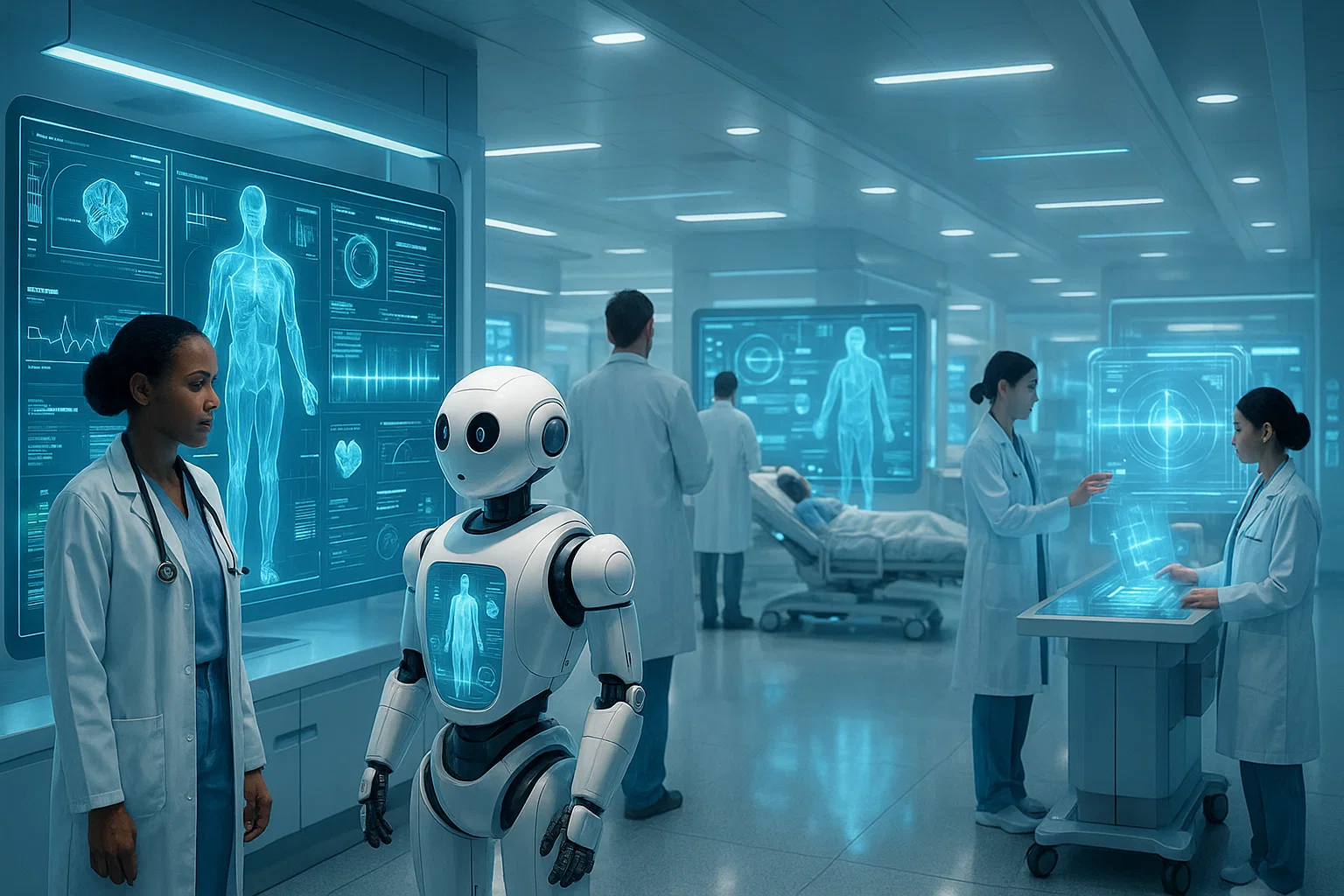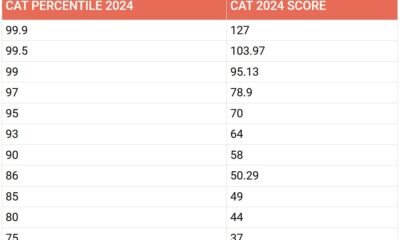HEALTH AND FITNESS
The Future of Healthcare: How AI is Changing Diagnostics, Automation, and Patient Care
Published
4 months agoon
By
admin
Introduction
Artificial Intelligence, as we have seen, has crossed the conceptual and futuristic divide to become the pivot that defined modem knowledge advances in the making of new drugs. Now, it offers a fresh take on diagnosis, cuts administrative costs, and offers meaningful insight into excellent patient care.
Market research speaks of AI healthcare technology’s rapid expansion. Grand View Research has put the Global AI Healthcare Market at the valuation of $26.57 billion in 2024, pushing to $187.69 billion by 2030 at a CAGR of 38.62%.
Such growth is not just financial; it implies a paradigm shift in health administration. In every stage of health, AI applications are increasingly executing early diagnoses or automated administrative workflows or individualized patient-centric experiences.
Artificial intelligence plays a significant role in the healthcare of modern times.
In healthcare, medical AI refers to the use of advanced algorithms and software that help medical professionals to make decisions faster and more accurately with more information. AI systems sift through massive healthcare datasets such as patient medical records, a plethora of diagnostic images, laboratory test results, or records of clinical studies, picking out patterns and insights that may be difficult, or at least time-consuming, for human beings to comprehend. In factoring for decisions, it helps clinicians to give personalized treatment options to patients which leads to better improvement in treatment.
What differentiates AI from conventional software is that it learns or improves based on new information or new data. In other words, the more data it receives, the more intelligent and efficient it becomes. By this way, the development of AI is revolutionizing healthcare because it possibly aids in the understanding of complicated medical conditions and enhances diagnosis accuracy.
AI as a Partner to Healthcare Providers
AI acts as a vital partner to healthcare providers, enhancing rather than substituting human clinical skills. These intelligent systems empower decision-making and streamline workflows. For instance, AI may detect early-onsets of cancer and cardiovascular diseases by analyzing diagnostic images and laboratory data way before symptoms set in.
Furthermore, AI systems act as a kind of projector for patient prognosis: They are able to inform the clinician about any complications that may arise or about the risk of readmission, hence putting the healthcare team on the path of prevention. On the administrative side, AI assists with appointment scheduling, billing, and updating records for the patient. Once such mundane tasks are automated, the healthcare personnel would then be able to concentrate more on actual patient care and interaction.
How Artificial Intelligence Helps Healthcare Professionals in Delivering Better Care
Artificial intelligence is not a substitute for medical expertise. Unlike the physician, AI can be thought of as a helpful tool that complements human skills. By helping with clinical and operational tasks, AI enables healthcare professionals, including doctors, nurses, and administrators, to make decisions more quickly and on an informed basis.
For instance, AI tools can throw up red flags for early signs of some disease such as cancer or heart disease by processing certain imaging scans or lab data before any symptoms appear. Detecting a health anomaly in this earliest stage may be vital for timely intervention and better prognosis.
It also helps in anticipating patient outcomes, enabling doctors to foresee complications or chances of re-hospitalization and thus create more proactive care plans. In the background, AI trims down other administrative aspects—setting up appointments, billing, or handling EHRs—that can very well keep healthcare teams occupied instead of spending enough time in direct patient care.
Key Technologies in AI That Are Reshaping Modern Healthcare
There is now a potent web of AI technologies at work in healthcare. AI technologies enhance processing in isolated tasks to optimally redefine the entire healthcare ecosystem. The processes might range from early diagnosis and personalization of treatments to optimization of the operational aspect and better resource management.
Machine Learning
Deeply entrenched in a vast volume of historical health data, advanced machine-learning algorithms look for significant patterns in the data and very accurately forecast patient outcomes and disease progression. Such systems might, for instance, ascertain how likely it is that a patient will develop diabetes or heart disease and, hence, offer them early interventions and preventive care.
Natural Language Processing (NLP)
NLP allows a machine to comprehend and analyze human language. In healthcare, NLP is used to extract useful information from unstructured forms such as clinical notes, medical literature, and patient reviews. It allows shorter documentation time and also ensures that critical information is not ignored.
Computer Vision
The analysis and deciphering of visual data, such as X-rays, MRI, and CT scan images, is done via computer vision. Such systems and processes can notice anomalies like tumors or fractures or infections with utmost accuracy, sometimes to the extent of being comparable or superior to even human specialists.
Robotic Process Automation (RPA)
RPA handles administrative, time-consuming, repetitive tasks like claims processing, appointment scheduling, or billing. During such repetitive workflows, RPA eliminates possible human errors, cuts operational costs, and allows healthcare personnel more time for direct patient care.
The aforementioned technologies, therefore, have their deep integration in clinical setup-from diagnostics, treatment planning, patient engagement, and hospital management. Being the case today, with its resources being poured into perfecting these technologies, it would be safe to guess they will indeed continue to significantly streamline the delivery of health care, improve outcomes, and spur innovations across the industry.
The Healthcare System
The… Artificial intelligence is slowly, but surely, bringing in changes in every layer of the healthcare ecosystem, far beyond the realm of diagnosis and interpretation. In fact, AI unifies operations in hospitals, patient experience, pharmaceutical development, and public-health strategies to drive forth a connected, efficient, and proactive model of care.
The result is a decreased no-show rate, optimum utilization of clinicians’ valuable time, and enhanced opportunities for patients to develop access to care.
Automated Billing and Claims Validation: In the States, almost as many as half of the hospitals are carried by billing tools powered by AI for insurance verification, detection of discrepancies in coding, and rejection of claims. In a 2025 study, the number integrating AI into revenue cycle management stood at 46%, with 20% rating the level of error reduction as significant and 30% observing the faster payment.
Coding Assistance for Clinical Work: AI tools interpret clinical notes, identify conditions and procedures, and recommend corresponding standard codes. This prevents rejections and increases the accuracy of reimbursements.
Predictive Resource Management: AI forecasts patient volume and staffing needs.
Boosting Patient Engagement and Experience
Patient engagement is very necessary for an effective health service. When patients feel engaged and well informed while supported by the system, they tend to follow treatment plans and achieve better health outcomes. AI has been the tool that changes patient experiences within healthcare systems making care more accessible, personalized, and convenient.
Healthcare assistant and chatbot services: These AI tools provide assistance any hour of the day and can perform any job pertaining to a large variety of tasks: answering questions about medical concerns, scheduling appointments, clarifying insurance details, and perhaps even following up after treatment. Research states that routinely 80 percent of questions from patients are within these tools’ ability, thus freeing human personnel to attend to those matters requiring direct human intervention.
Reminders and follow-ups are automated: Supporting treatments and workflows, AI systems will rise to the occasion of giving an alert predicting missed medication and reps for confirming an appointment, and so forth.
Personalized health coaching: The platform integrated with wearables tracks the data, e.g., heart rate, activity levels, or sleep patterns, to generate personalized health prescriptions and notify clinicians of detected anomalies.
Multilingual communication support: These AI translation tools ensure the bases of patients receive an explanation in their respective native language for greater accessibility and satisfaction.
Accelerating Therapeutic Development and Personalized Treatments
Artificial intelligence is transforming new therapeutic methods and the customization of individual treatments. Traditionally, research and development of efficacious treatments have been long and expensive processes-taken years or decades. AI fast tracks this journey because it processes massive volumes of biological and clinical data to rapidly pinpoint candidate compounds and therapeutic theories much faster than human researchers could.
AI-Designed Therapeutic Candidates: The first human trials from therapies designed entirely through AI-driven research mark a new age in precision medicine, being pioneered by companies such as Alphabet’s Isomorphic Labs, a DeepMind spin-off. Also, SandboxAQ released 5.2 million molecular structures into a synthetic dataset to speed protein-drug interaction modeling.
Repurposing Existing Drugs: Firms like Ignota Labs use AI to resurrect previously failed drug compounds by finding safety improvements, bringing the process under two years and the cost below $1 million.
Mid-Stage Molecule Successes: Insilico Medicine has advanced AI-generated candidates into Phase II human testing for lung and fibrotic diseases-level of establishing that AI can track lifestyle markers and accelerate the trial.
Protein-Structure Revolution: AlphaFold and similar tools have predicted with accuracy more than 200 million protein structures-a revolutionary breakthrough that drastically curtails the time from target discovery to the development of potent therapeutic candidates.
Advancing Public Health and Strategic Planning
Having explored some of the medical areas where AI intervenes, let us now quickly touch upon aspects related to AI’s involvement with long-term planning. Interdisciplinary analysis by means of AI systems on vast datasets should be able to detect trends that will require appropriate countermeasures. The emerging threat or the evident challenge can now be faced by health agencies and governments using AI.
Outbreak Identification: The system studies disease outbreaks by analyzing medical records, search trends, and environmental data and detects early such outbreaks for timely containment.
A Forecasting Tool for Asset Allocation: It forecasts bed occupancy, medication stockouts, and equipment needs, thereby permitting logistics managers to address these issues beforehand.
Modeling the Effects of Public Health Interventions: Using AI, health authorities simulate the effect of policies being considered for vaccination campaigns or disease control measures so that decision-makers are able to envision the effect prior to the implementation.
Realistic Application of AI in Patient Care
The real-world use of AI does more in improving diagnosis and clinical operations-it changes the entire patient-care experience. In building a patient-centered and forward-looking health ecosystem, AI is facilitating increased access to care, communication and interactions with providers, and health management.
24/7 Virtual Care Guides
AI-based virtual assistants and chatbots are on their way to being very essential for patient support. They provide 24/7 customer support to persons with common queries such as scheduling appointments, medication reminders, and follow-up calls after visits. These systems actually use conversational language to build a comforting vibe and freely escalate trickier issues to their human counterparts. World Pharma Today claims these tools enrich access, patient satisfaction, and cost-efficiency of telemedicine services.
Smart Reminders and Ongoing Check-Ins
Non-adherence to medication schedules and missed appointments are major challenges in healthcare delivery. AI-driven systems send personalized reminders via SMS, email, or mobile apps. These prompts adapt to the patient’s behavior and preferences, reinforcing treatment plans and reducing missed visits. Evidence indicates that such reminders can boost overall compliance and engagement.
Tailored Wellness Support
Nonadherence to medications and skipping appointments have been the biggest on-road blocks in healthcare delivery. AI systems send personal reminders via SMS, email, or mobile applications. These reminders adapt to the individual’s behavior and past preferences regarding treatments, thus guaranteeing greater reinforcement in the treatment plans while simultaneously reducing the number of no-shows. These interventions are evidenced to improve compliance and treatment engagement.
Communicating Better and Accessibility
Access to medicine should be free of charge for all. The AI-based language translation system provides interpretation in real time so the patient can be instructed in his/her language. These happens to be very good tools for sound-based services for the hearing impaired and sight-based services for the visually impaired. Such accessibility means serve the purpose of clear communication between the patient and the provider and provide service on an inclusive note.
Understanding and Learning from Patient Experience
Advanced AI systems go through patient comments, satisfaction surveys, and online reviews to spot new issues or concerns so the health providers may adequately address the concerns thereupon and improve from real-life feedback and thus become a patient-centric institution.
Why It’s Important
-
Virtual chat services open access for patients and alleviate administrative tasks.
-
Personalized reminders and coaching foster healthy habits and obedience to treatment.
-
Real-time translation and accessibility tools provide fair treatment for every patient.
When well integrated, AI can be used to elevate physician-patient interaction, engage patients, and inculcate inclusive and effective healthcare delivery.
What Did AI Hold for Healthcare in the Future? Follow These Trends
Machine learning in wearable technologies and health monitoring is undoubtedly one of the really exciting developments to look out for. These systems give real-time information about vital parameters, activity levels, and other indicators related to health, thus allowing clinicians to detect an issue beforehand and intervene in a timely manner before complications set in. The turning point toward uninterrupted, preventative care should cut down hospital readmissions and create better outcomes for persons working with a chronic condition.
Other key edges include very swift advancements in natural language processing. AI models are getting better and better in the understanding of clinical language, the processing of unstructured data taken from medical records, and the support of more natural interactions between patients and providers. They will make clinical documentation better and more accessible, easing patient-provider communication, especially for multilingual or underserved populations.
Key Trends Shaping the Future of AI in Healthcare
With the advent of more mature AI algorithms, their role in healthcare has shifted from experimental settings to applications deemed essential. Thus, what was previously a subject for pilots and labs has active operational realms in patient care, clinical decision-making, and other health system activities. A few ideas and trends have popped up in support of a somewhat more intelligent, connected, and personalized type of healthcare over the next years.
- Wearable Integration with Remote Monitoring: Continuous watch on health parameters will ensure that proper and preventive care is given timely. This decreases in emergencies with an increase in good health.
- Next Generation Natural Language Processing: This higher and deeper understanding of clinical documentation or a patient’s query by AI actually must promote better communication and lean workflows.
- Targeted Therapies with AI: With the help of AI, targeted therapies have been discovered from genomic data, clinical trial data, and real-world evidence.
- Open Safe Innovation Collaborative Ecosystem: The highways between doctors, researchers, and policymakers are preserved to ethically design and implement AI solutions.
Conclusion
In many ways, AI assists in revolutions in healthcare-from better diagnosis to aiding operational workflows to improving the patient experience. Still, things like data privacy and smooth integration remain valid concerns, which, if taken from a comprehensive approach, may be resolved with the collaborative efforts of health care providers and tech-world innovators. A great insight on how AI, digital innovation, and healthcare work hand-in-hand is present at TecWebPro, your home for deep reference on healthcare technology.

Understanding CAT Score vs Percentile: A Friendly Guide for Students

Healthcare Digital Marketing – SEO vs SEM: What Works Best?

Avil 25 MG Tablet: Uses, Side Effects, Price & Dosage

The Future of Healthcare: How AI is Changing Diagnostics, Automation, and Patient Care

Understanding CAT Score vs Percentile: A Friendly Guide for Students

Healthcare Digital Marketing – SEO vs SEM: What Works Best?

Avil 25 MG Tablet: Uses, Side Effects, Price & Dosage




